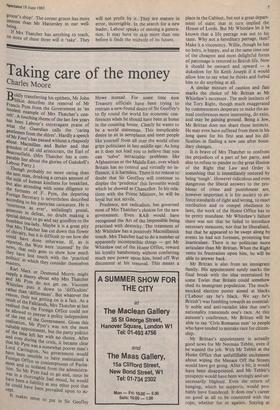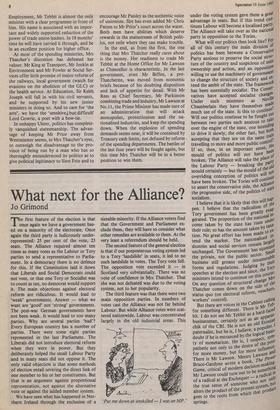Taking care of the money
Charles Moore
Boldly transferring his epithets, Mr John Silkin describes the removal of Mr Francis Pym from the Government as 'an insolent example of Mrs Thatcher's con- ceit'. A touching theme of the last few years has been Labour's extravagant praise of what the Guardian calls the `caring gentlemen from the shires'. Hardly a speech of Mr Foot's has passed without a rhapsody about Macmillan and Butler and that grandest of all old aristocrats, the Earl of Beaconsfield. (Mrs Thatcher has a com- parable line about the glories of Gaitskell's Labour Party.)
the
Though probably no more caring than bnext man, drinking a certain amount of e milk of human kindness for breakfast, ut also attending with some diligence to the fortunes of F. Pym, the departing Foreign Secretary is nevertheless described according to his patrician caricature. He is courteous as ever', unfailingly genial, generous in defeat, no doubt making a special detour to go and say goodbye to the humblest tea-lady. Maybe it is a great pity that Mrs Thatcher has cut down this flower of chivalry, but it is difficult to see how she reported,
news, that he t Wets were 'stunned' by the on goes show uch
they have lostly to touch with thehow 'practical
politics' in which they consider themselves Masters,
Karl Marx or Desmond Morris might supply a theory about why Mrs Thatcher and Mr Pym do not get on. Viscount Whitelaw puts it down to 'difficulties' rather than 'differences'. But whatever the reason, their not getting on is a fact. As a result of the Falklands, Mrs Thatcher at last realised that the Foreign Office could not be allowed to pursue a policy independent of the rest of the Government. Given this realisation, Mr Pym's was not the most suitable appointment, but the party politics of the time left her with no choice. After and even during the crisis, it became clear that Mr Pym was a somewhat poorer man's Lord Carrington. No government would have been sensible to have maintained a Foreign Office so contemptuous of Parlia- ment and so isolated from the administra- tion. So Mr Pym had to go and, since he was in a thoroughly bad mood, he would have been a liability at any other post that hept,e could have been prevailed upon to ac-
It makes sense to put in Sir Geoffey Howe instead. For some time now Treasury officials have been trying to restrain a new-found desire of Sir Geoffey's to fly round the world for economic con- ferences when he should have been at home in the counting house. Clearly he wants to be a world statesman. This inexplicable desire to sit in aeroplanes and meet people like yourself from all over the world often grips politicians in late middle age. As long as it does not lead you to believe that you can 'solve' intractable problems like Afghanistan or the Middle East, over which Britain has no control and virtually no in- fluence, it is harmless. There is no reason to doubt that Sir Geoffrey will continue to display the 'prudence' (his favourite word) which he showed as Chancellor. In his rela- tions with the Prime Minister, he will be loyal but not servile.
Prudence, not radicalism, has governed most of Mrs Thatcher's choices for the new government. Even RAB would have recognised the Art of the Impossible being practised with dexterity. The treatment of Mr Whitelaw has a positively Macmillanish touch. Mrs Thatcher had to do a number of apparently incompatible things — get Mr Whitelaw out of the Home Office, reward his loyalty handsomely without conferring much new power upon him, head off Wet discontent at his removal. This meant a place in the Cabinet, but not a great depart- ment of state; that in turn implied the House of Lords. But Mr Whitelaw let it be known that a life peerage was not to his taste. Why not a hereditary peerage, then? Make it a viscountcy. Willie, though he has no heirs, is happy, and at the same time one of the cheapest and most delightful forms of patronage is restored to British life. Now it should be onward and upward — a dukedom for Sir Keith Joseph if it would allow him to say what he thinks and forbid him to do anything at all.
A similar mixture of caution and flair marks the choice of Mr Brittan as Mr Whitelaw's successor. The mob instincts of the Tory Right, though much exaggerated by commentators desperate to make the an- nual conferences more interesting, do exist, and may be gaining ground. Being a Jew, Mr Brittan does not share those instincts. He may even have suffered from them in his long quest for his first seat and his dif- ficulties in finding a new one after boun- dary changes.
It is brave of Mrs Thatcher to confront the prejudices of a part of her party, and also to refuse to pander to the great illusion of the Right that Law and Order is something that is immediately restored by being 'tough'. However ridiculous and even dangerous the liberal answers to the pro- blems of crime and punishment are, however important it is for society to en- force standards of right and wrong, to exact retribution and to compel obedience to laws, the work of the Home Office has to be pretty mundane. Mr Whitelaw's failure there was not that he failed to introduce necessary measures, nor that he liberalised, but that he appeared to be swept along by events he had not foreseen, protesting but inarticulate. There is no politician more articulate than Mr Brittan. When the Right vents its frustration upon him, he will be able to answer back.
Mr Brittan is also from an immigrant family. His appointment surely marks the final break with the idea entertained by some Tories that Britain could somehow shed its immigrant population. The much- mocked election poster aimed at blacks (Tabour say he's black. We say he's British') was fumbling towards an essential- ly noble and anti-racialist idea that one's nationality transcends one's race. At this autumn's conference, Mr Brittan will be able to say 'Civis Romanus sum' to people who have tended to mistake race for citizen- ship.
Mr Brittan's appointment is actually good news for Mr Norman Tebbit, even if he wanted the job. With Mr Tebbit at the Home Office that unfulfillable excitement about wiping the Menace Off the Streets would have got going. After a bit, it would have been disappointed, and Mr Tebbit's prospects would have been wrongly and un- necessarily blighted. Even the return of hanging, which he supports, would pro- bably have foundered. It does one's career no good at all to be connected with the rope, whether for or against. Staying at Employment, Mr Tebbit is almost the only minister with a clear programme in front of him. His name is associated with an impor- tant and widely supported reduction of the power of trade union leaders. In 18 months' time he will have carried it through, and be in an excellent position for higher office.
At most of the spending ministries, Mrs Thatcher's discretion has defeated her valour. Mr King at Transport, Mr Jenkin at Environment and Mr Fowler at Social Ser- vices offer little promise of major reform of the railways, local government (watch for evasions on the abolition of the GLC) or the health service. At Education, Sir Keith Joseph will fall in with his civil servants, and be supported by his new junior ministers in doing so. And to care for 'the arts', we have the 'sensitive,' bull difficult' Lord Gowrie, a poet with a bow-tie.
In unhappy Ulster, politics has complete- ly vanquished statesmanship. The advan- tage of keeping Mr Prior away from Westminster seems, in Mrs Thatcher's eyes, to outweigh the disadvantage to the pro- vince of being run by a man who has so thoroughly misunderstood its politics as to give political legitimacy to Sinn Fein and to encourage Mr Paisley as the authentic voice of unionism. She has even added Mr Chris Patten to Mr Prior's court across the water. Both men have abilities which deserve rewards in the mainstream of British polit- ics, not exile where they can make trouble.
In the end, as from the first, the one thing that Mrs Thatcher really cares about is the money. Her readiness to trade Mr Tebbit at the Home Office for Mr Lawson as Chancellor is characteristic. In the last government, even Mr Biffen, a pre- Thatcherite, was moved from economic briefs because of his doubting disposition and lack of appetite for detail. With Mr Rees as Chief Secretary, Mr Parkinson combining trade and industry, Mr Lawson at No.11, the Prime Minister has made sure of an administration that will attack monopolies, protectionism and the na- tionalised industries, and keep the spending down. When the explosion of spending demands seems near, it will be contained by Treasury cash limits, not defused by reform of the spending departments. The battles of the last four years will be fought again, but this time Mrs Thatcher will be in a better position to win them.







































 Previous page
Previous page